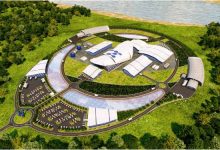NuScale, the controversial proponent of nuclear small modular reactor designs that has been championed by the federal Coalition and technology ideologues around the world, has had its flagship project cancelled because of rising costs.
NuScale is often cited as the company with the most advanced plans on nuclear SMRs – a technology that does not actually exist in the commercial market – and had planned to build six such 77 MW reactors in Utah under a much vaunted proposal.
But the contract has been cancelled because its proposed customers – mostly municipal based utilities – refused to pay the target price for nuclear power, which had already jumped earlier this year by 53 per cent to $US89 a megawatt hour ($A139/MWh), despite a $US30/MWh subsidy from the US government.
The US Department of Energy had bet heavily on the technology, and NuScale itself, giving it $US600 million since 2014, according to a Reuters report, and promising a further $US1.35 billion for the Utah project in 2020.
NuScale is the only developer of SMRs to have received a licence from US nuclear regulators, but had to go back to the drawing board and re-apply after deciding that the licenced SMR design was too small to be commercial successful. Now it seems that the bigger units don’t add up either.
Despite the fanciful nature of the technology, and an expected wait of at least 20 years for it to be commercially available in Australia, if at all, nuclear SMRs have been pushed heavily by the Coalition and conservative media, particularly the Murdoch press, Sky News, the AFR and various radio networks.
They have argued that Australia should halt the closure of coal fired power stations, stop the rollout of new transmission lines and new wind, solar and storage projects, and wait for SMRs to appear – despite the increased urgency of climate action and emission cuts urged by scientists.
Some nuclear proponents have said, absurdly, that SMRs could be brought to Australia within a decade, but most of the media have had to resort to interviewing emergency doctors, school children and sales people to find any support for that idea.
The NuScale news was seized upon by Australian energy minister Chris Bowen, who noted that a “grassroots” pro nuclear social media campaign run by Coalition energy spokesman Ted O’Brien was organised by a former Nuscale staff member.
“The Opposition’s only energy policy is small modular reactors,” Bowen said in a statement. “Today, the most advanced prototype in the US has been cancelled. The LNP’s plan for energy security is just more hot air from Peter Dutton.”
NuScale’s share crashed on the news, falling more than 20 per cent according to Reuters, taking their losses since August last year to more than 80 per cent as the market reassessed the company’s claims.
NuScale still wants to pursue SMRs, and hopes to build up to 2GW of plants in Ohio and Pennsylvania for Standard Power, but it is now targeting markets where there is less regulatory oversight and more government support. Reuters says it is looking at Poland, Ukraine, Kazakhstan and Romania.
The New York Times reports that decision to cancel the project followed an update from NuScale this year regarding the cost of building the reactors, which had soared to $US9.3 billion – for just 462 MW of capacity – from $US5.3 billion because of rising interest rates and inflation.
This translates to a capital cost of US$20,000/kW , or $A31,130/kW, 70 per cent higher than the $18,167/kW cost that CSIRO projected for 2030 in their GenCost Report. Members of the Coaliton and Australia’s small but vocal nuclear advocacy community have frequently lambasted CSIRO as having exaggerated the costs.
Mason Baker, the CEO of UAMPS, the group of municipal utilities in Utah that had signed up to the proposed SMRs, said the decision to cancel the contract was “the best course” and “what is best for member communities.”
In a statement, Baker said the utilities will look at alternative technologies for their low carbon energy needs. In an interview with a local newspaper, he cited wind and solar projects, geothermal and gas plants with a mix of green hydrogen as likely alternatives.
See also: The end of Oppenheimer’s nuclear energy dream: Modular reactors supported by ideology alone
AFR’s sloppy journalism makes a nonsense of its case for nuclear SMRs
The stunning stupidity of the Coalition nuclear push is now in plain view
Nuclear energy remains weapon of choice for climate deniers and coal lobby










